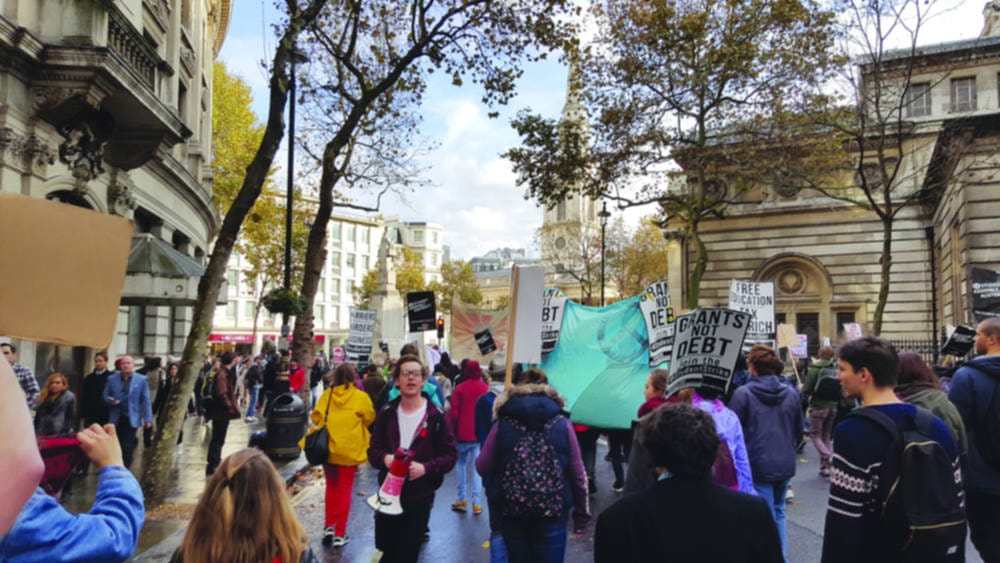The Green Paper – a student's view
Are we about to witness the sculpting of a new higher educational landscape?

Too many universities in England have allowed teaching to become a “poor cousin to research”.
This was a quote from Universities Minister Jo Johnson. It seems the government have responded accordingly to this dilemma.
So what is the Green Paper exactly? The Green Paper is a governmental document which outlines proposals to “reward excellent teaching with reputational and financial incentives”. There is no commitment to action; instead it acts as a tool used to simulate discussion.
It primarily aims to boost teaching standards, support more people (from disadvantaged backgrounds) into university and to give students better value for money from their education.
The proposal is partly based around the notion that not all universities assign teaching the same level of importance as research. High quality research is currently rewarded via the Research Excellence Framework (REF). The government now aims to mimic this concept by implementing the Teaching Excellence Framework – rightfully so.
Despite favouring this seemingly great reward system, we must scrutinise the implications of this proposal. The framework will act as a substantial measure of an institution’s educational potential. It will likely be used as a basis for deciding league table positions. From the 2017/18 academic year, it will even be used as a mechanism for granting higher-ranked institutions the ability to increase fees for new students.
Mr Johnson claimed that whilst many academic institutions go above and beyond, there are many that opt for a “disengagement contract”.
Like any market fuelled by competition, there are winners and losers
On the one hand, it is likely that the presence of stronger incentives for excellent teaching will drive universities to optimise their own teaching potential. On the other hand, we must ask ourselves if the additional fee income will exacerbate the gap between the competences of higher and lower ranked universities.
Will this fuel the creation of an elitist educational hierarchy comprised of divided teaching-based and research-based institutions?
It seems the proposal is aiming to make the higher education sector increasingly marketable and accessible to a wider group of prospective students. Like any market fuelled by competition, there are winners and losers. Will we see a rise in ‘losing institutions’ that struggle to keep pace with it all?
Another defensive angle which Mr Johnson employed during interrogation of the proposal was the need to compensate for a “skills shortage and a skills mismatch” with graduates entering the working world. He felt that the proposal would act as a robust solution for unfavourable graduate employment levels. The question in response to this is quite simple: are we witnessing a skills shortage, or a job shortage?
Statistically, a growing population has dictated an increasing level of purchased goods, services and business start-ups meaning more jobs. Some industries, including Oil and Gas, are in particularly low demand for graduate jobs currently. Therefore, both sides can be argued.
Interestingly, it seems that the government are inclined towards manipulating the National Student Survey (NSS) as an assessment basis for the TEF. Therefore, the NSS will likely have a greater bearing on things than ever before.
I personally feel this is where Imperial College, as an established and capable institution, should really start to up the ante. Imperial’s NSS output (2% above the sector average for student satisfaction in 2015) is already remarkable and is only getting better thanks to the hard work of many. Nonetheless, I believe the implementation of other NSS-related incentives for Imperial students would only improve the situation. Introducing an inter-departmental prize specifically for the most improved participation rate (compared to the previous academic year) seems like a sound option, for example.
This would require the future collaboration of the Deputy President of Education (student union representative) with the Imperial education office and faculty leadership to introduce such a prize.
I think it is imperative that we as students understand and respect the main consequences of the Green Paper for us as young professionals entering the working world. One way of raising awareness is through the effective communication of this information to the Imperial student population, provoking a well needed interest in the subject.
Another way in which the Green Paper could significantly impact the educational landscape is via the implementation of the Grade Point Average system. This will alter the current ‘degree band’ scheme as we know it. It would aim to support employers in making recruitment decisions, as well as helping students to track their progress throughout the course duration, not just during exam period.
The proposals in the Green Paper have huge scope to benefit many, including the under-privileged, yet it seems its modification to the educational landscape will provoke controversy. Are we witnessing an attempt to genuinely improve the quality and accessibility of English universities, or are we faced with a framework within which universities will compete on every level in order to financially sustain themselves?
It’s time for you and I to address the proposal and adapt to the change.








